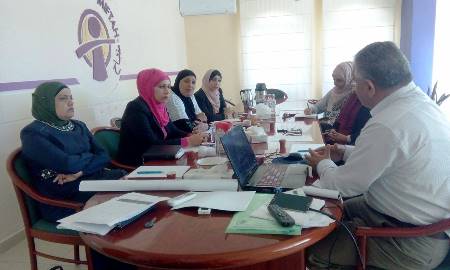|
Introductory workshop at MIFTAH on gender integration in urban planning
On October 16, MIFTAH held an introductory workshop on the importance of gender integration in urban planning. Several town and village council members attended the meeting, in addition to a ministry of local government representative. The workshop is part of MIFTAH’s gender integration activities at all decision- making levels and builds on MIFTAH’s participation in the United Nations Conference on Housing and Sustainable Urban Development – Habitat III, 2016, held in Quito, Equador. The meeting was aimed at providing town and village council members with the necessary skills to strengthen their roles and involve them in the planning of built-up population areas. MIFTAH’s participation in this activity is a continuation of its interventions aimed at supporting women’s participation in decision-making positions within LGUs. The meeting highlighted several concepts and terms used in the planning process and the importance of women’s participation in this process so that the needs of women and other marginalized sectors could be included in the planning process on the ground. Ultimately, the completed process will coincide with the needs of the various components of society, eventually culminating in sustainable and just development based on the participation of all sectors in planning for the future of their localities. The basic stages involved in the preparation of structural planning were discussed, including the stages of the development guidelines, conducted through a study of the targeted locality and its connection and influence in its surrounding region. After that, proposed alternatives are developed to direct the development and land usage , which is steered towards using the land for development purposes, including categorizations for the local population and health, education and other basic services. The meeting closed with the development of an intensive action plan in the next few days which includes meetings with the team. The activities include field visits to the proposed planning area, Aseera Shamaliyeh, in order to identify the problems and challenges that must be taken into consideration from a gender perspective. The participants noted that the workshop’s importance was that it offered an opportunity to female council members to participate in the planning process and receive approval from the local governance minister for Aseera Shamaliyeh’s structural plan. The plan takes into consideration the need to integrate women’s needs in the planning process from a gender perspective so as to guarantee the fair distribution of resources and organized services.

http://www.miftah.org |